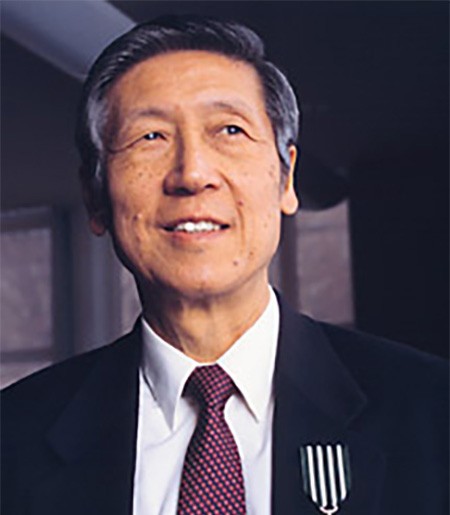Professor emeritus, musician and scholar John Hsu dies
By Daniel Aloi
John Hsu, the Old Dominion Foundation Professor Emeritus in the Humanities, died March 24 in Chapel Hill, North Carolina. He was 86.
Hsu joined the Department of Music in 1955 and was a member of the Cornell faculty for 50 years, retiring in 2005. He served as department chair from 1966 to 1971 and was named the Old Dominion Foundation Professor in 1976.
Through the years, he gave lessons to students of cello and viola da gamba, and taught courses in music theory, music history and performance practice. He was a world-renowned player of the viola da gamba and baryton, and an acclaimed Joseph Haydn interpreter and scholar.
“John was a dear and beloved friend, and a true performer-scholar-teacher-colleague who embodied the possibilities of what a professor of music can be,” said Steven Pond, associate professor of music and department chair.
Born in 1931 in Swatow (Shantou), China, Hsu fled the Sino-Japanese war with his family, first to Hong Kong and then Shanghai, where he began to study the cello. He came to the United States in 1949 to attend Carroll College in Wisconsin, and transferred the following year to the New England Conservatory of Music in Boston, where he earned undergraduate and master’s degrees in 1953 and 1955, respectively.
Hsu was awarded the conservatory’s Honorary Doctor of Music degree in 1971 and the Outstanding Alumni Award in 2003.
During his Cornell career, Hsu served as conductor of the Cornell Chamber Orchestra, the Cornell Symphony Orchestra, Cornell Collegium Musicum and the Sage Chapel Choir.
In introducing the viola da gamba as a solo recital instrument in 1961, Hsu initiated the development of historical performance practice at Cornell, attracting expert faculty in the field and leading to the establishment of a center for the study of 18th-century instrumental music and a graduate degree program in historical performance practice.
He founded the Cornell Summer Viol Program in 1970, which continued through 1996 and became the longest-running summer music program devoted to the study of the French solo viola da gamba performing tradition.
Hsu played cello in the Amadé Trio, a faculty chamber ensemble active from 1974 to 1997, with fortepianist Malcolm Bilson and Baroque violinist Sonya Monosoff.
Bilson, the Frederick J. Whiton Professor of Music Emeritus, said his development as a player and scholar of early pianos was heavily influenced by Hsu. “He was chairman when I was hired in 1968,” Bilson said. “I came here as a ‘regular’ pianist; I hardly knew about old pianos. Much of what I eventually became I owe to him as a colleague, a mentor and a wonderful friend, especially meaningful to me at that time.”
Hsu toured throughout the United States and Europe as a conductor and instrumentalist, and released several award-winning recordings including CDs of Haydn’s Baryton Trios and French Baroque viol music on a series of Musical Heritage Society LPs in the 1970s.
He was the author of “A Handbook of French Baroque Viol Technique” (1981), and edited a seven-volume set of French composer Marin Marais’ complete instrumental works.
In 2001, the government of France bestowed the Chevalier de l'Ordre des Arts et des Lettres on Hsu, in recognition of his lifelong commitment to French Baroque music as a scholar, performer and teacher.
Hsu also was artistic director of the Aston Magna Foundation for Music and the Humanities from 1985 to 1990; a founder of the Apollo Ensemble, a 14-member period-instrument chamber orchestra dedicated to performing Haydn’s early symphonies; artistic director and conductor of the Atlanta Baroque Orchestra from 2004 to 2009; and guest conductor in 2009, 2010 and 2014 of the Vivaldi Project based in Washington, D.C.
Following Hsu’s retirement, the Department of Music established the John Hsu Orchestral Fund to honor his legacy and 50 years of teaching. With his wife, Martha, a retired Cornell librarian, he moved to North Carolina in 2010.
“John and Martha were two of the most friendly and welcoming people I met when I first arrived at Cornell,” said associate professor of music Kevin Ernste. “He was curious about my work, insightful, generous, and wise. He was someone whose humble smile betrayed almost none of the great mind and nuanced artistic sensibility that lurked behind it. I'm grateful to have known him, however fleetingly.”
Survivors include his wife of 49 years, Martha Russell Hsu; two sisters and a brother.
Media Contact
Get Cornell news delivered right to your inbox.
Subscribe

